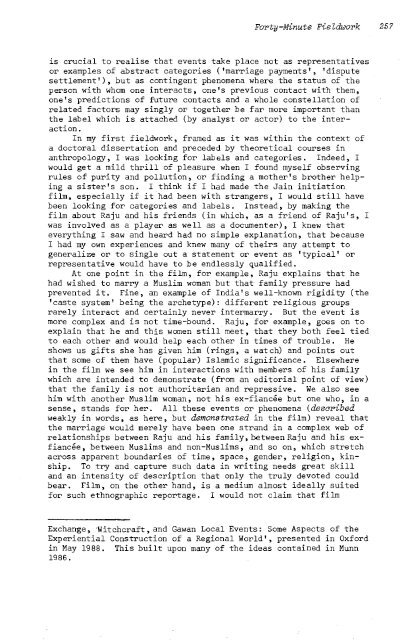CONTENTS NO.I - Institute of Social and Cultural Anthropology ...
CONTENTS NO.I - Institute of Social and Cultural Anthropology ...
CONTENTS NO.I - Institute of Social and Cultural Anthropology ...
Create successful ePaper yourself
Turn your PDF publications into a flip-book with our unique Google optimized e-Paper software.
Forty-Minute Fieldwork 257<br />
is crucial to realise that events take place not as representatives<br />
or examples <strong>of</strong> abstract categories ('marriage payments', 'dispute<br />
settlement'), but as contingent phenomena where the status <strong>of</strong> the<br />
person with whom one interacts, one's previous contact with them,<br />
one's predictions <strong>of</strong> future contacts <strong>and</strong> a whole constellation <strong>of</strong><br />
related factors may singly or together be far more important than<br />
the label which is attached (by analyst or actor) to the interaction.<br />
In my first fieldwork, framed as it was within the context <strong>of</strong><br />
a doctoral dissertation <strong>and</strong> preceded by theoretical courses in<br />
anthropology, I was looking for labels <strong>and</strong> categories. Indeed, I<br />
would get a mild thrill <strong>of</strong> pleasure when I found myself observing<br />
rules <strong>of</strong> purity <strong>and</strong> pollution, or finding a mother's brother helping<br />
a sister's son. I think if I had made the Jain initiation<br />
film, especially if it had been with strangers, I would still have<br />
been looking for categories <strong>and</strong> labels. Instead, by making the<br />
film about Raju <strong>and</strong> his friends (in which, as a friend <strong>of</strong> Raju's, I<br />
was involved as a player as well as a documenter), I knew that<br />
everything I saw <strong>and</strong> heard had no simple explanation, that because<br />
I had my own experiences <strong>and</strong> knew many <strong>of</strong> theirs any attempt to<br />
generalize or to single out a statement or event as 'typical' or<br />
representative would have to be endlessly qualified.<br />
At one point in the film" for example, Raj.u explains that he<br />
had wished to marry a Muslim woman but that family pressure had<br />
prevented it. Fine, an example <strong>of</strong> India's well-known rigidity (the<br />
'caste system' being the archetype): different religious groups<br />
rarely interact <strong>and</strong> certainly never intermarry. But the event is<br />
more complex <strong>and</strong> is not time-bound. Raju, for example, goes on to<br />
explain that he <strong>and</strong> this women still meet, that they both feel tied<br />
to each other <strong>and</strong> would help each other in times <strong>of</strong> trouble. He<br />
shows us gifts she has given him (rings, a watch) <strong>and</strong> points out<br />
that some <strong>of</strong> them have (popular) Islamic significance. Elsewhere<br />
in the film we see him in interactions with members <strong>of</strong> his family<br />
which are intended to demonstrate (from an editorial point <strong>of</strong> view)<br />
that the family is not authoritarian <strong>and</strong> repressive. We also see<br />
him with another Muslim woman, not his ex-fiancee but one who, in a<br />
sense, st<strong>and</strong>s for her. All these events or phenomena (described<br />
weakly in words, as here, but demonstrated in the film) reveal that<br />
the marriage would merely have been one str<strong>and</strong> in a complex web <strong>of</strong><br />
relationships between Raju <strong>and</strong> his family, between Raju <strong>and</strong> his exfiancee,<br />
between Muslims <strong>and</strong> non-Muslims, <strong>and</strong> so on, which stretch<br />
across apparent boundaries <strong>of</strong> time, space, gender, religion, kinship.<br />
To try <strong>and</strong> capture such data in writing needs great skill<br />
<strong>and</strong> an intensity <strong>of</strong> description that only the truly devoted could<br />
bear. Film, on the other h<strong>and</strong>, is a medium almost ideally suited<br />
for such ethnographic reportage. I would not claim that film<br />
Exchange ,'Witchcraft, <strong>and</strong> Gawan Local Events: Some Aspects <strong>of</strong> the<br />
Experiential Construction <strong>of</strong> a Regional World', presented in Oxford<br />
in May 1988. This built upon many <strong>of</strong> the ideas contained in Munn<br />
1986.

















